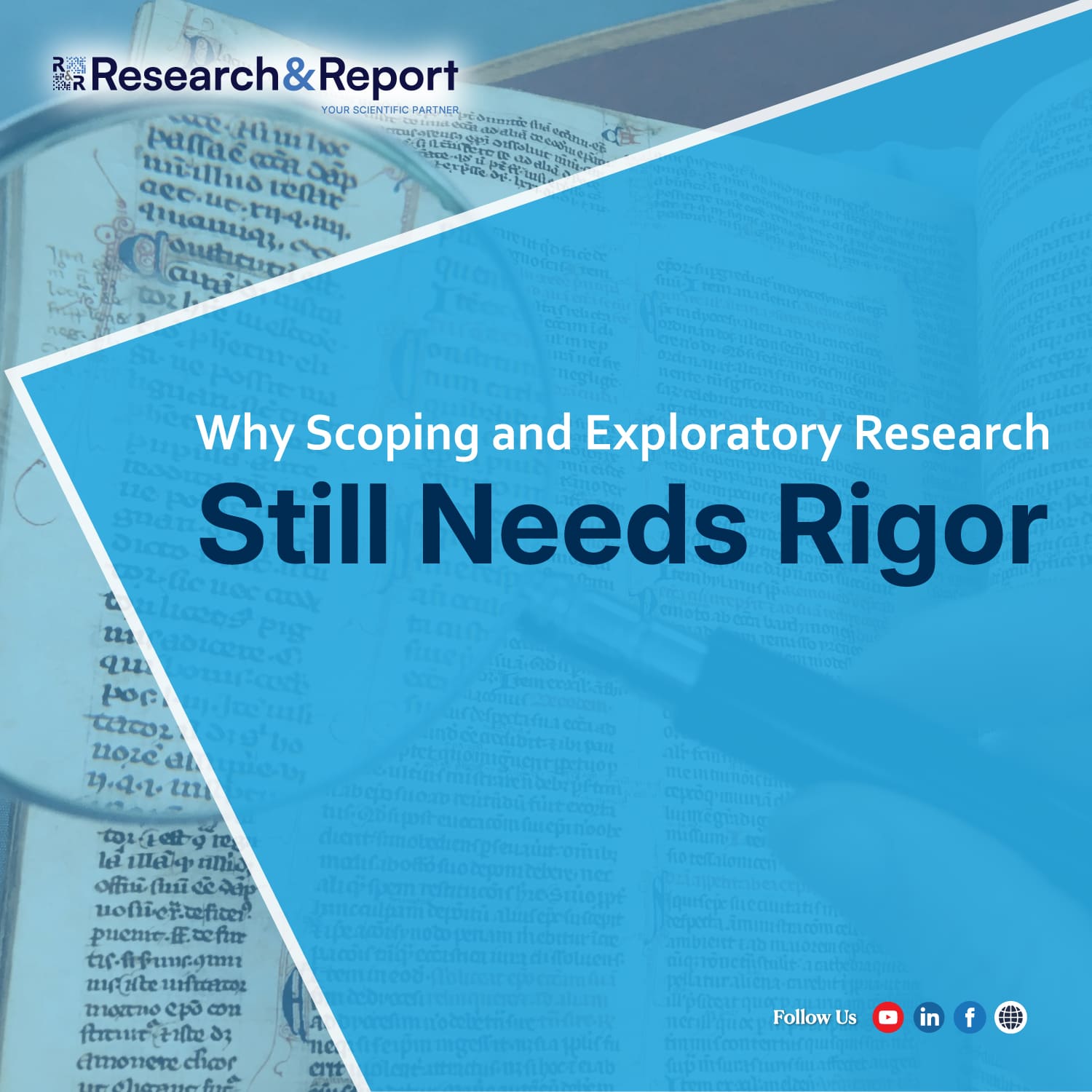In academic and applied research circles, the terms scoping and exploratory often carry an unintended implication: that the work is preliminary, informal, or exempt from rigor.
That’s a dangerous myth.
At Research & Report, we frequently observe a pattern: researchers use the label “exploratory” to excuse vague questions, ad-hoc methods, or weak analytical structure — especially in early-stage or interdisciplinary work. But scoping and exploratory studies are not methodologically inferior; they simply serve different purposes than explanatory or hypothesis-driven research.
If anything, they require more care, more clarity, and stronger transparency to be useful, credible, and citable.
What Counts as Scoping or Exploratory Research?
- Scoping research maps the key concepts, theories, or evidence in a field — often used to define the breadth and boundaries of a research area.
- Exploratory research investigates phenomena where prior understanding is limited — typically used to refine questions, identify variables, or build conceptual frameworks.
Both are foundational — not optional — to sound knowledge production.
Critical Issues Researchers Often Overlook
1. No Protocol or Framework
Many scoping studies skip formal protocols like PRISMA-ScR, Arksey & O’Malley’s framework, or Joanna Briggs Institute guidelines, leading to unclear inclusion criteria and inconsistent coverage.
Without a framework, the “scope” becomes subjective, and findings become non-replicable.
2. Poorly Articulated Research Questions
Exploratory studies often ask broad questions — but that doesn’t mean they should be vague. Ambiguity in purpose leads to ambiguity in design and outputs.
A clear question allows for structured exploration. A vague one produces noise.
3. Inadequate Search and Selection Strategy
Researchers may use limited databases, skip grey literature, or fail to document search strings, screening decisions, and exclusion rationales.
This undermines transparency and reproducibility — two pillars of trustworthy evidence.
4. Lack of Analytical Structure
Exploratory does not mean descriptive-only. Yet many studies fail to code, categorize, or thematically synthesize findings, offering summary instead of insight.
Narrative does not equal analysis. Rigor demands methodical coding and synthesis, even in exploration.
5. No Reflexivity
Researcher bias, positionality, and disciplinary lens shape what gets included, excluded, and interpreted — yet these are rarely acknowledged in exploratory designs.
Reflexivity isn’t just for qualitative ethnographies — it’s critical for early-stage mapping too.
What Rigor Looks Like in Scoping and Exploratory Research
- Use an established framework or protocol (e.g., PRISMA-ScR, JBI, Arksey & O’Malley)
- Define clear inclusion/exclusion criteria — even if broad
- Systematize your literature search — and report it transparently
- Thematize your findings — use analytical tools like coding frameworks or conceptual mapping
- Engage with limitations and reflexivity — be honest about scope and blind spots
- Link to future work — show how your study seeds deeper inquiry
Why It Matters
Scoping and exploratory studies:
- Guide funding priorities
- Shape policy white papers
- Define PhD trajectories
- Get cited in systematic reviews and meta-analyses
But none of that happens if the research lacks methodological integrity.
Exploration requires structure. Scoping requires system. Rigor is not optional — it’s what makes early research impactful.
Final Thought
Whether you’re preparing a scoping review, designing an exploratory case study, or mapping an emerging field — rigor is your anchor.
Don’t confuse open-ended inquiry with unstructured execution. At Research & Report, we help scholars and practitioners design early-phase research that’s methodologically sound, strategically aligned, and publication-ready.
Let your exploration lead the field — not mislead it.
Want to explore more insights! visit Research & Report blogs

